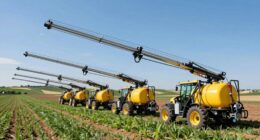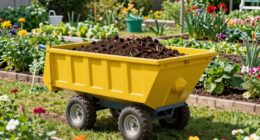California water projects, like Delta tunnels and infrastructure upgrades, impact family farms by affecting water availability and management. These projects can provide more reliable supplies, helping you plan planting seasons and reduce drought losses. However, changes in water flow and costs also pose challenges, requiring adaptation and conservation strategies. By understanding these developments, you can explore ways to protect your farm’s future—keep going to discover how water management shapes farm sustainability.
Key Takeaways
- California water projects aim to improve water reliability for farms, impacting planting schedules and crop yields.
- Infrastructure changes can create opportunities and challenges for family farms depending on water access.
- Water conservation strategies like drip irrigation help farms reduce costs and adapt to water supply fluctuations.
- Implementing conservation practices enhances farm resilience and supports sustainable agriculture amid water scarcity.
- Staying informed on water project developments enables family farms to plan effectively and ensure long-term viability.

Have you ever wondered how California’s ambitious water projects impact family farms across the state? These projects, like the California Water Fix and the Delta tunnels, aim to redirect and manage water resources more efficiently. But for family farmers, understanding how these large-scale efforts influence agricultural sustainability is essential. Water is the lifeblood of farming, and changes in water supply can determine whether your crops thrive or struggle. That’s why many farmers are adopting water conservation strategies to adapt to shifting water availability and guarantee their farms remain productive.
California water projects shape farm sustainability; conservation strategies ensure resilience amid changing water supplies.
When water projects alter the flow of water, they often bring both opportunities and challenges. On one hand, improved infrastructure can provide more reliable water supplies, which helps farmers plan their planting seasons better and reduces the risk of drought-related losses. On the other hand, if water becomes more scarce or expensive, it can pressure family farms to find smarter ways to use what they have. That’s where water conservation strategies come into play. Techniques like drip irrigation, soil moisture sensors, and precise scheduling help you minimize water waste and maximize efficiency. These practices not only make your farm more resilient but also contribute to the broader goal of agricultural sustainability.
Implementing water conservation strategies isn’t just about saving water; it’s about creating a sustainable future for your farm. For example, switching to drip irrigation reduces runoff and evaporation, ensuring more water reaches your crops’ roots. Installing soil moisture sensors allows you to tailor your watering schedule, applying water only when necessary. These smart systems help you cut costs on water and energy and reduce your environmental impact. Additionally, crop selection also plays a role. Choosing drought-resistant varieties or adjusting planting times can align your farm’s needs with the available water resources, further supporting sustainability efforts.
California’s water projects influence the entire agricultural landscape, but your response as a family farmer determines how well you adapt. Embracing water conservation strategies can help you navigate the uncertainties of water supply while promoting long-term agricultural sustainability. These efforts not only safeguard your farm’s productivity but also contribute to the health of the entire ecosystem. As the state continues to develop its water infrastructure, staying informed and proactive about efficient water use will be essential. In this way, you can help guarantee that your family farm remains viable for generations to come, despite the challenges posed by California’s complex water management landscape.
Frequently Asked Questions
How Do Water Projects Impact Local Ecosystems Around Family Farms?
Water projects can notably impact local ecosystems around family farms by disrupting wildlife corridors and altering natural water flow. As you pursue urban development, you may inadvertently fragment habitats, making it harder for wildlife to migrate and find resources. These changes can reduce biodiversity and harm the balance of local ecosystems, so it’s essential to plan carefully and consider sustainable water management practices that protect wildlife and support the health of your farming environment.
What Are the Long-Term Economic Effects on Small Farmers?
You’ll find that small farmers often face economic challenges over the long term, with many experiencing a 30% decline in profitability due to water restrictions. These projects can threaten your economic resilience by limiting water access, making it harder to compete and access markets. Without reliable water, your ability to sustain farm operations and expand market access diminishes, potentially leading to financial instability and reduced community significance over time.
How Is Water Quality Monitored and Maintained in These Projects?
You monitor water quality through regular water testing to detect contaminants early. Pollution prevention measures, like proper waste disposal and runoff control, help keep water clean. You also inspect infrastructure and enforce regulations to guarantee compliance. By staying vigilant with testing and prevention, you maintain healthy water supplies, protect ecosystems, and support sustainable farming practices. This proactive approach minimizes risks and preserves water quality for the long term.
Are There Any Legal Disputes Related to Water Rights?
You might notice legal conflicts over water rights often arise unexpectedly, reflecting complex disputes. These conflicts stem from competing claims among farmers, municipalities, and environmental groups. Such disagreements can delay projects and complicate water distribution. You should stay informed about ongoing legal disputes, as they impact water availability and policy decisions. Resolving water rights issues requires careful negotiation, legal action, and collaboration to guarantee fair access for all stakeholders involved.
How Do Water Projects Influence Farm Sustainability Practices?
Water projects greatly influence your farm’s sustainability practices by encouraging water conservation and improving irrigation efficiency. You can adopt new technologies, such as drip irrigation or soil moisture sensors, to reduce water waste. These projects often support funding and resources for sustainable practices, making it easier for you to conserve water and increase crop yields. Ultimately, they help you maintain a resilient, environmentally friendly farm while managing water resources more effectively.
Conclusion
As you stand at the crossroads of California’s water projects, remember they’re more than just pipes and reservoirs—they’re the lifeblood of family farms. Like delicate threads in a vast tapestry, your choices weave a future of growth and sustainability. Protecting these water sources isn’t just about irrigation; it’s about safeguarding the roots of your community, symbolized by the river’s steady flow that sustains everything it touches. Your actions shape tomorrow’s harvest.










